ISTAS, the flagship conference of IEEE SSIT, will be held this year in Hong Kong, virtually November 10-12, 2022



ISTAS, the flagship conference of IEEE SSIT, will be held this year in Hong Kong, virtually November 10-12, 2022

As an SSIT member, you can take advantage of the Multiple Society Discount Program to connect across several IEEE Societies… Read More

Worldwide, there are 55 million individuals living with dementia and it is projected that by 2050, this number will increase to 139 million. Technological devices and solutions that can benefit the dementia community also carry ethical implications such as privacy and issues of consent. AI-driven LBS solutions may exacerbate the marginalization of individuals living with dementia.
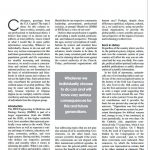
Governmental Affairs: Article by Luis Kun in May-June 2008 issue of EMB Magazine on Science, Technology, and Censorship.

In the first six months of 2018, eight New York City yellow cab drivers, impacted by big tech disruption on the taxi industry, took their own lives. “I am not a Slave and I refuse to be one,” wrote one in his suicide note.

The 2022 IEEE International Symposium on Digital Privacy and Social Media (ISDPSM 2022) with the theme “Applying Engineering Solutions to a Complex Set of Issues” will take place in Silicon Valley, San Jose, California, USA on August 1, 2022 at San Jose Marriott Hotel.

Having a philosophical road map to what is required, might help those with skills to design intelligent machines that will enable and indeed promote human flourishing.

The term “modern indentured servitude” did not originate with this workshop, but we hope that this special issue has highlighted many of the different shapes and processes it can take, some more insidious than others. We would like to think that, if each paper could talk, they would get up one after the other and say, “No, I’m Spartacus.” In these dark times, each of us needs the courage to be Spartacus.

Where do historical debates take us? Their political and economic contexts are similar to ours, and even the list of technological issues is familiar. Many decades later, institutions still feel shaky, economies remain inequitable, geopolitics are increasingly multipolar, and societies are riven by technological change.

Access Volume 3 Issue 2 – Special Issue on Machine Learning, Convergence Digitalization and The Concentration of Power Current Issue… Read More

It would be good if whenever a client connected to an http server, or indeed any app connected with a central server, the server responded with a corresponding acknowledgment of data, along the lines of “Before we begin our session this morning, I would like to acknowledge the traditional owner of the data which is being transferred, and respect rights to privacy, identity, location, attention and personhood.”
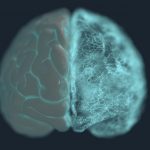
One can see the emergence of ever more efficient forms of intelligence as networked self-similar patterns that are embedded in the universe at its core, driven as they are by the sustained maximization of entropy as a causal force. As a maximizer of future freedom of action, the very existence of gravity can be viewed as a form of embedded, purposeful, goal-directed form of intelligence.
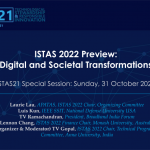
The Special Session “Digital and Societal Transformations” took place during IEEE International Symposium on Technology and Society (ISTAS) 2021 on 31 October 2021…. Read More
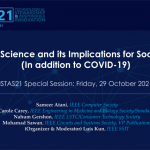
The Special Session “Life Science and its Implications for Society” took place during IEEE International Symposium on Technology and Society (ISTAS) 2021 on… Read More
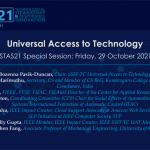
The Special Session “Universal Access to Technology” took place during IEEE International Symposium on Technology and Society (ISTAS) 2021 on 29 October 2021…. Read More
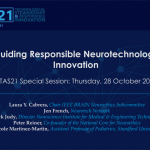
The Special Session “Guiding Responsible Neurotechnological Innovation” took place during IEEE International Symposium on Technology and Society (ISTAS) 2021 on 28 October 2021…. Read More
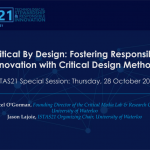
The Special Session “Critical By Design: Fostering Responsible Innovation with Critical Design Methods” took place during IEEE International Symposium on Technology and Society (ISTAS) … Read More
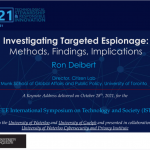
Ron Deibert presented “Investigating Targeted Espionage: Methods, Findings, Implications” as a Keynote during IEEE International Symposium on Technology and Society… Read More

IST-Africa 2022 was a highlighly successful, dynamic and intense week, with rich and impactful discussions around both opportunities and challenges… Read More